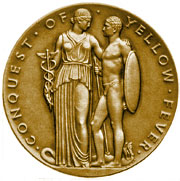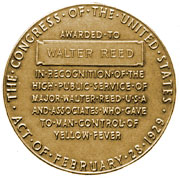| Walter Reed Medal | |
|---|---|
 Front (A) and back (B) of the Walter Reed Medal. | |
| Awarded for | Meritorious achievement in tropical medicine or global health by an individual or an institution |
| Sponsored by | American Society of Tropical Medicine & Hygiene |
| First award | 1936 |
| Website | https://www.astmh.org/awards-fellowships-medals/awards-and-honors/walter-reed-medal |
The Walter Reed Medal may refer to the Congressional Gold Medal awarded to Major Walter Reed in 1929, [1] or a medal currently awarded by the American Society of Tropical Medicine and Hygiene. [2]
Contents
The Walter Reed Medal was established by the American Society of Tropical Medicine and Hygiene in 1934 to be awarded periodically in recognition of meritorious achievement in tropical medicine by an individual or an institution. [3] The story of how Walter Reed led the Yellow Fever Commission in Havana that discovered the mosquito vector of the disease is legendary. [2] The first medals were awarded in 1936, one medal was awarded to Mrs. Emilie Lawrence Reed to posthumously honor her husband Major Walter Reed for his work on Yellow Fever, and another to The Rockefeller Foundation for its study and control of Yellow Fever. [2] [3] Starting in 2021, the Walter Reed Medal was awarded annually. [2]
It is of interest that in 1942 in a spirit of ecumenism, the award was made posthumously to Carlos J. Finlay - a Cuban contemporary of Walter Reed - to whom many credit the original idea that Yellow Fever was a mosquito-borne disease. [2]

